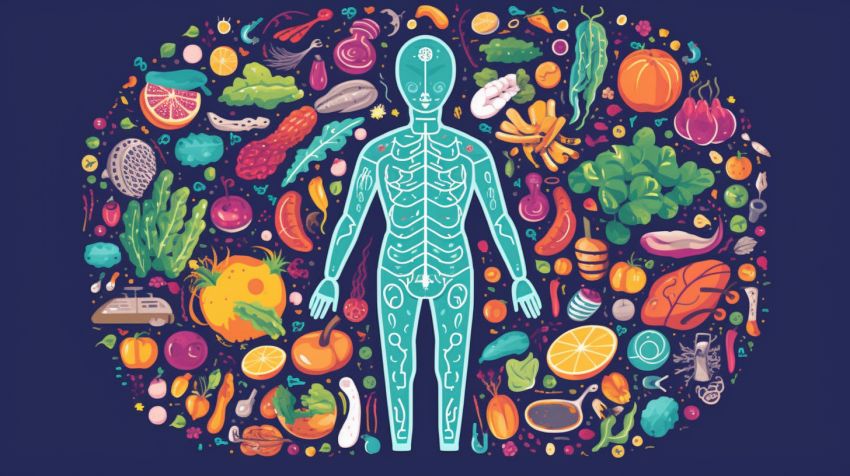Sometimes we take our gut for granted. We give little thought to the vital part it plays in our well-being, even though its health affects us on every level.
If the gut is unhealthy, you could feel it in various ways, from brain fog to autoimmune disease.
The link between your gut and overall health is undeniable, and it can be either a big stumbling block or a wind beneath your wings, depending on how you decide to treat it.
How does your gut affect your overall health?
The health and function of our gut microbiome directly mirror how we treat our bodies.
There needs to be a balance between the "good" and "bad" bacteria and other microorganisms to absorb and use all the necessary vitamins and minerals properly.
The whole system can get out of whack if there's a glitch.
Hormones
The most important thing to keep in mind is that a good part of our hormones, most notably serotonin, is produced in the gut.
This is why poor gut health is connected to mental health problems such as anxiety and how we deal with stress.
Some people use supplements to manage their hormonal levels better, and while things like serotonin or natural cortisol-reducing supplements can help, it's better to nip the problem in the bud.
Hormones that regulate your sense of hunger and insulin sensitivity also come from the gut, which is why an unbalanced gut microbiome is tied to obesity, type 2 diabetes, irritable bowel syndrome, and various autoimmune conditions.
So when people say that their metabolism is problematic, they usually mean this.
Management of Nutrients and Toxins
The food you eat is in charge of providing you with the nutrients you need to be healthy.
If your gut's health isn't optimal, the whole digestive tract has to work harder to give the body the nourishment it needs.
In addition, when you don't get the necessary nutrients, your immune system suffers, which can lead to various diseases that seemingly have nothing to do with your gut.
Another important role your gut microbiome plays in your health is getting rid of toxins.
In optimal conditions, your digestive tract uses all the nutrients it needs and disposes of the waste.
However, when the system is compromised, those toxins remain stuck in your metabolism, spreading and wreaking havoc as they go.
This is known as a "leaky gut" and can cause many health issues that are difficult to predict.

Connection to the Heart
Even though it might seem unlikely, your gut health is connected to your heart.
As you know, the body is a perfect system; everything is linked to everything else, so one problem can echo through your entire metabolism. That's exactly what happens here.
We already know that regularly consuming food that is high in cholesterol can cause a heart condition. Well, it all starts in the gut. Eating lots of red meat for example, makes it difficult for your gut to digest it properly.
The result can be a dangerous organic compound that, at high enough levels, can cause heart disease and high blood pressure.
One easy way to prevent this is to pay special attention to what you eat and consume fiber daily.
The list doesn't end here. Your gut health affects pretty much everything in your body, including:
- Immune system and chronic inflammation
- Eyes
- Skin and bones
- Reproductive organs
This doesn't mean you should obsess about it, but you should remember just how important it is. That could help you make healthier choices about food and your lifestyle.
How to Keep Your Gut Healthy
Thankfully, there are ways to work on and improve your gut health, and often it can be as simple as being more mindful and having a diverse, healthy diet.
Generally, a well-balanced diet solves many health problems, and that is the first step to making sure your gut microbiome is as balanced as possible.
Here are some steps you can take.
A Healthy, Diverse Diet
It all starts with our eating habits.
We now know that there are food types that support our gut health – most of all, fruits, vegetables, whole grains, and nuts. They're high in fiber and much more easily digested than red meat.
Fermented foods such as yogurt, kefir, and kombucha are excellent for your gastrointestinal system. This is because they have a lot of "positive" bacteria that can be put to good use in your gut microbiome.
Refined sugars, caffeine, fatty foods, and alcohol are on the other side of the spectrum and are often at the root of the gut imbalance. They take a long time to digest and mess with the microbiome's balance.
What also might help is having several smaller meals throughout the day so that your stomach and bowels have the time to digest and use the nutrients you send them.

Staying Active
The benefits of being active cannot be overstated.
Moving on a regular basis, be it running, hiking, weight lifting, or anything in between, will make you and your gut feel better simply because when you move, your gut moves as well.
These contractions let your bowels get the most out of the food and efficiently eliminate unnecessary excess.
All this helps your immune system stay strong and protect you, so it's a win-win combo.
Stress Management
When you're stressed, you can't perform at an optimal level, which is a fact. The same goes for your gut.
We already talked about leaky gut, which can be caused by exposure to high-stress situations. Once the toxins leak into your metabolism, there's no knowing what chaos they could create.
This shows that stress management isn't optional anymore; it's essential.
As you can see, the importance of your gut's health is unprecedented.
It affects how you feel on a day-to-day basis, how strong your immune system is, as well as your mental health. Your gut is the basis of your well-being; the more you take care of it, the more it will return the favor.

















